About the conference
Science has always been a neutral mediator, adept at building bridges and transcending boundaries, whether they are geographical, political, or societal in nature. This spirit was epitomized by the 2023 „Building Bridges for the Next Generations“ conference in Dresden. Building on this success, the Free State of Saxony aims to continue the fruitful dialogue that was sparked among international partners in Central Europe with a follow-up event: Building Bridges for a Net Zero Future.
Achieving Net Zero is a crucial objective because it holds the key to fostering sustainable economic growth and technological innovation. The strong infrastructure and connectivity in Central Europe, coupled with a rich history of scientific innovation, create an environment conducive to pioneering the transformative technologies and policies necessary to achieve Net Zero. The conference will thus focus on these key areas of research, that define the region of Central Europe:
Join us at the „Building Bridges for the Next Generations“ conference in 2024 as we explore these critical research areas and foster connections that will shape the future.
The Helmholtz-Zentrum Dresden-Rossendorf (HZDR) will once again be entrusted with organizing the event.
Impressions from the last event
By clicking on the thumbnail, you agree that external content from Youtube is displayed to me. Personal data may be transmitted to third-party platforms in the process.



 This measure is co-financed by
This measure is co-financed by